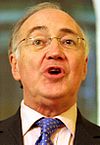- Conservative Party (UK) leadership election, 2003
-
Conservative Party (UK) leadership election 
2001 ← 6 November 2003 → 2005 
Candidate Michael Howard Party Conservative Popular vote unopposed
Leader before election
Iain Duncan-Smith
Elected Leader
The 2003 Conservative leadership election was caused by the enforced resignation of incumbent leader Iain Duncan-Smith after the loss of a confidence vote amongst his parliamentary party. The causes of Duncan-Smith's fall are often cited as his lack of charisma and impact with the public, the uninspired direction of the party under his leadership, and his previous failure to achieve more than a third of support amongst MPs in the 2001 leadership Contest. In the event, the party coalesced around Michael Howard as replacement leader and there was not a contest to replace Duncan-Smith.
The fall of Iain Duncan Smith
Duncan Smith's leadership was damaged by his lack of support amongst many of his MPs and the perception that he was a weak uncharismatic leader. On 14 February 2003 former MP Barry Legg was selected as Conservative Party Chief Executive. He was from the right of the party and replaced moderniser Mark MacGregor. This triggered factional infighting and on 23 February 2003 The Independent newspaper published a story that members of parliament were considering a vote of confidence due to Duncan Smith's perceived unelectability. On 1 May 2003 Crispin Blunt resigned from the Conservative front bench and demanded a no confidence motion in Duncan Smith, the day before local government elections. On 7 May Barry Legg resigned amid continuing disquiet.
On 13 October 2003 the parliamentary watchdog began an investigation into Duncan Smith's past employment of his wife as his diary secretary. There were allegations that she was on the parliamentary payroll for apparently doing no work. On 18 October Sir Patrick Cormack suggested that Duncan Smith should call a vote of confidence in his leadership. On 22 October major party donor Stuart Wheeler said there was an overwhelming case to replace Duncan Smith.
For a vote of confidence to occur 15 percent of Conservative MPs (at the time, 25 MPs) had to write to the Chairman of the 1922 Committee demanding the vote. On 26 October, amid mounting claims that the threshold of 25 was about to be reached, Duncan Smith made an appearance on television daring his opponents to show their hand by the evening of 29 October, or to withdraw their challenge. He also stated that he would not step down if a vote was called. On 28 October Sir Michael Spicer, chairman of the 1922 Committee, announced that he had received at least 25 votes and the vote of no confidence was held on 29 October 2003. Duncan Smith lost the vote 75-90. (It, perhaps, should be noted that the demand by Duncan Smith to have the matter "resolved" by 29 October had no bearing in the party constitution. Had the required number of votes not been received until 30 October - or later - the result would have been the same, in that a vote of confidence would still have been called by Sir Michael Spicer.)
The rise of Michael Howard
As soon as the result of the confidence vote was known MPs David Davis and Oliver Letwin announced that they were supporting former Home Secretary Michael Howard. Kenneth Clarke and Tim Yeo announced they would not be running. Michael Ancram, deputy leader of the party, gave the qualified statement that he would not stand against Howard so long as no other candidate came forward - widely seen as a warning against other candidates standing. The prospect of a sole candidate raised many questions as to whether or not ordinary party members would have the opportunity to decide whether they accepted Howard as leader, with some suggestions for an all-member ballot. No other candidates came forward and Howard was elected unopposed on 6 November 2003. The board of the Conservative Party decided not to have that ratified by the party membership.
External links
Michael Howard Politics Shadow Cabinet • Folkestone and HytheGeneral election Party elections 1997 • 2003Categories:- Conservative Party (UK) leadership elections
- 2003 elections in the United Kingdom
Wikimedia Foundation. 2010.

